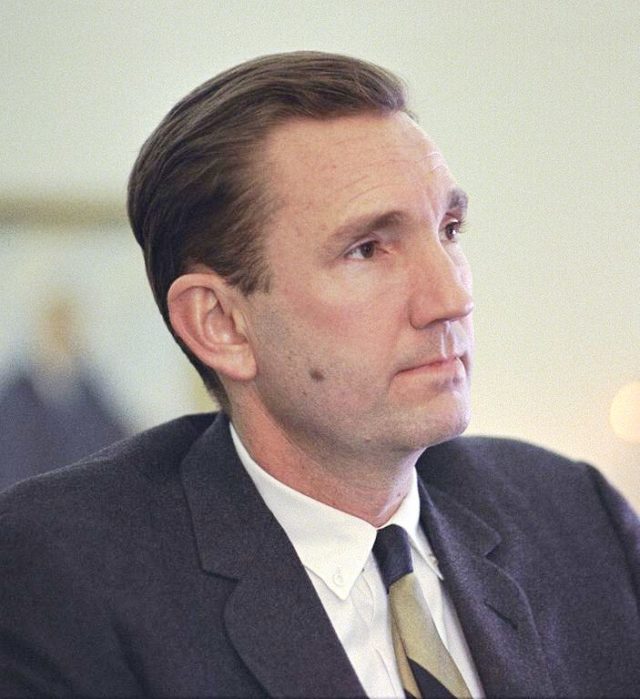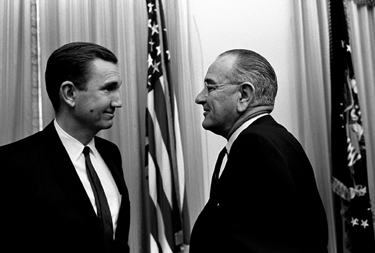[Editor’s note: This is the first of two conversations between artist Rachel Mason and former US Attorney General Ramsey Clark. He speaks about his years in the Department of Justice, where he worked with Robert Kennedy and was tasked with desegregating high schools. Clark went on to become a radical anti-death penalty activist, defending war criminals and dictators including Saddam Hussein, which he discusses in part two.]
In 2007, I began questioning what it meant to be an artist making expensive commodities in America during a time of war. When I thought about how my creative output connected to global conflicts, I realized that, at the center of everything, was human beings. And I wanted to know about the human beings who were at the center of the conflicts.
So I started an inventory of every war that occurred during every year of my life by studying the faces of individuals at the heads of various global conflicts. I started researching their lives, I wrote songs about them, and I stared at them for a very long time, making little figurines. After completing two albums of songs and over a hundred porcelain busts, I had a happenstance meeting with then editor-in-chief of The Nation Magazine, Hamilton Fish V, who suggested that I look up Ramsey Clark, former United States Attorney General.
Ramsey Clark’s biography almost doesn’t seem real. He was destined for a front row seat to history from the start; his father was a Supreme Court Justice, and by age 34 he was working in the Department of Justice under John F. Kennedy and slid into the office of Attorney General by 1966, under Lyndon B. Johnson. In the following decades, many would come to consider him a traitor for his radical anti-death penalty activism: defending the likes of dictators like Saddam Hussein and Slobodan Milosevic, perpetrators of genocide like Pastor Elizaphan Ntakirutimana, and conspirator to blow up the World Trade Center, Sheik Omar Abdel Rahman, to name a few. To my great surprise, Clark answered the phone on the first ring and allowed me to come to his house and ask him questions.
In one of what was to be a few conversations, he told me about working in the Department of Justice under Kennedy and Johnson, during the Civil Rights Movement. It was a brief moment of hope which countered a basic assumption of today’s foreign policy, the inevitability of evil.
Ramsey: I went into the Department of Justice at the beginning of the Kennedy Administration. I was there from January 20 of 1961, to January 20 of 1969, the full eight years of Kennedy-Johnson.
Rachel: Do you have any poignant memories or specific of personal moments with President Kennedy, or Bobby Kennedy?
Ramsey: Well, I worked daily with [Bobby] for four years, from the night of November 20th, 1963. The White House held what’s called a Judicial Reception, a big reception for all the major judges from around the United States and the Supreme Court, and a lot of other people involved with the Department of Justice. I was the youngest of the Presidential appointees in the Department of Justice, and Bob Kennedy was second youngest.
November 20th is also Bob Kennedy’s birthday. Eight or ten of us were holding a party for Bobby in the Attorney General’s office.
So, it was around 11 o’clock, and Bobby Kennedy jumped up on his desk like a Roman orator and started giving a sarcastic, jesting speech about how much he had helped the President over the years. The Department of Justice happens to do a lot of things that anger a lot of people, and he would have been dealing with a lot of that. Like Jimmy Hoffa, the Labor leader– organized labor was very angry at [Bobby Kennedy] the time. And then he said something strange: “Well, I guess Bob will leave before the end of the year to take over his campaign for the reelection.” I said, “Where did you get that from?” I wondered why he would make a speech like that.
Anyway, then Bob invited me and my wife Georgia to the Residence, where the Presidential family lives for cake. The President and Jackie were young, and she was about the same age as Georgia. The President was just about 10 years older, and they just looked so radiant and beautiful. They were leaving for Dallas, my hometown. They went to Houston first, the next morning. That was the night of the 20th. The assassination was on the 22nd.
Rachel: Where were you when Kennedy was assassinated?
Ramsey: I was having lunch in office in the Department of Justice, and the phone rang. Some guy in the office said, “Turn on your radio.” I turned on the radio, and it said that Kennedy had been shot. The first thing I did was run up to the Attorney General’s Office. Bob Kennedy was out at his home, Hickory Hill, it was a Friday, having lunch.
Here it is, however many hours later, that Saturday morning, when I walked in alone into the East Room, the same room where the party was. And it’s raining outside, and cold, and I’m kind of wet, and the shades are all drawn, and you barely see the casket out in the middle of the room. It had all that drapes around it, and the thing actually had wheels so you could push it.
They’d brought his body in that morning from the Naval Hospital. He died of course in Dallas, but they took him out to Naval Hospital, and the doctors examined them, and made all this technical stuff about the direction of the bullet, and things like that, as it hit the skull.
Rachel: Were you by yourself when you saw the casket?
Ramsey: I was in the room by myself, there wasn’t anybody there.
Rachel: I’m surprised there wasn’t anybody else there.
Ramsey: There were people who had been in there, and people coming in and out but … I’d come in with two other people, and maybe they were with me– I imagine they were, but my recollection was that I was alone. It was dark, and you could barely see the casket out there.
Rachel: It was an open casket?
Ramsey: No. The casket was closed at that time. It wouldn’t have been an open casket because he was hit in the head you know.
It was the only time of my life when I felt that I’d never be happy again. It was a strange and foolish thing, but it just seemed like [shooting the President] was such a crazy thing for someone to do. It was such beautiful life, it was so hopeful for the country– it showed us what you hope for.
It was pretty depressing. Were living in Virginia at the time– I’d go over Memorial Bridge on my way home every night, and I could see what they call the “eternal flame” at the gravesite. Not a great, big flame, but you could see it.
Then Bob didn’t come back to the Department that year. His whole life was tied up in his brother’s career, and he had ten kids. He was just devastated, he didn’t come back until January, and by February he thought he ought to be made Vice President.
Rachel: Do you remember your meetings the President?
Ramsey: Yeah. There were a bunch; they were what you would call politically-hot cases, and we had some really rough times with the Alabama senators. The guys were hot political cases you might say, but they were minor in terms of history.
Rachel: Can you tell me about your role in the Voting Rights Act?
Ramsey: Yeah. I was in charge of a division in the South, and I could barely perform my duties there because the problems were enormous. The school desegregation was one of the toughest issues, the high potential for violence to children. The Administration had started trying to order desegregation in schools, at the high school level, starting at Little Rock in 1957. High schools are big and tough, and they’ve got their own ideas about life. They had a bloody mess on their hands, and so we reversed that in ’61 and started with grammar school. I don’t think there was any proclamation of it being the reason, but that was the only one.
Rachel: What about the Japanese internment camps? Were you aware when you were a teenager what was happening after World War II ?
Ramsey: I was painfully aware because my father was in the Antitrust Division of the Department of Justice at that time. They’d appointed a Major General named DeWitt to be in charge of the relocation of the Japanese, and the Department of Justice assigned my father to be his legal head.
Rachel: Wow.
Ramsey: It was something he regretted, wrote about and talked about later, but …
Rachel: Did you have conversations with him at the time about that?
Ramsey: If I did, I don’t remember, but it wasn’t likely because he was gone nearly all the time. It was a hot job, and it involved coast to coast, and traveling back and forth to Washington.
Rachel: Have you been following the current presidential election?
Ramsey: Yeah. It’s not very inspiring.
Rachel: Has it alarmed you? Has it interested you?
Ramsey: Well I think it would be wonderful to have a woman for President, and she has a much better chance than [Bernie] Sanders. Sanders is an exceptionally decent and wise person, and would be cut above anybody we’ve had run for the office.
Rachel: I’m not sure if you’ve watched some of Trump’s rhetoric during this election process…I’m curious what your perspective is.
Ramsey: It is alarming. It’s not healthy, and the sad thing is, it’s calculated. The candidates say what they think will get them votes, not what they really believe. Not that the two are necessarily always separate, in a good person, but some of the rhetoric we hear is political, and the conviction of the candidates.
Rachel: What have you thought about Obama so far? When I first met you, the primaries hadn’t even started, the Bush Administration was still in full swing. I’m curious to know what you thought about his past eight years in office.
Ramsey: I think he’ll go down as one of our best peacetime Presidents.
Rachel: Peacetime? Do you think this is … Is this a peace time right now?
Ramsey: We are not in a big war.
Rachel: It’s interesting to hear you call it peace time right now. I’m fascinated by that.
Ramsey: If you are looking at the military budget, you’d assume we are in a huge war.
Rachel: Yeah.
Ramsey: That’s because we are looking forward to one. It hasn’t happened yet.




Comments on this entry are closed.
{ 1 trackback }